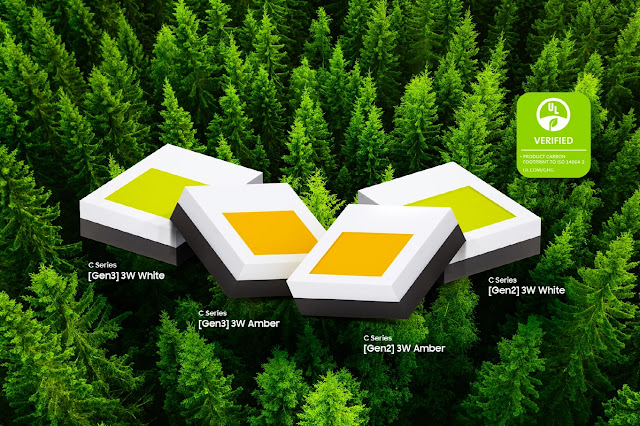memory products have received carbon footprint certification, with automotive LED enclosures joining the list of Samsung products to gain carbon footprint certification, setting the bar for the future. The effectiveness of memory goods in lowering carbon emissions has been recognised across the world, and an additional 20 memory products have gained carbon footprint certification.
The Carbon Trust’s ‘Reducing CO2’ Certification has been achieved by five memory products.
The Carbon Trust’s ‘Reducing CO2’ Certification has been achieved by five memory products. Five Samsung memory products – HBM2E (8 GB), GDDR6 (8 GB), UFS 3.1 (512 GB), T7 portable SSD (1 TB), MicroSD EVO Select (128 GB) – were recently awarded the “CO2 Reduction” labels. By Carbon Trust. Previous versions of the five products had received the Carbon Trust “Measured CO2” certification last year. The Carbon Trust also recently certified the product carbon footprint of 20 memory products1 by awarding them the “measured CO2” product carbon footprint label. The Carbon Trust is an independent and experienced partner of organizations that advises companies on their opportunities in a sustainable and low-carbon world.
The Carbon Trust also certifies the environmental footprint of organizations, supply chains and products. The Reducing CO2 label certifies that a product’s carbon footprint has been reduced. Samsung was able to reduce the carbon emissions of the five memory products through increased manufacturing efficiency. This means that less electricity and raw materials per chip were used. For the T7 SSD (1TB) laptop, Samsung used environmentally friendly paper rather than plastic as the packaging material to minimize the carbon footprint of the product. Samsung estimates that the volume of carbon emissions reduced by the five products, after their release until July 2021, is around 680,000 tonnes of CO2, which is equivalent to 11.3 million urban tree seedlings. cultivated for ten years or greenhouse emitted by 149,000 cars driven in one year.
UL has verified the carbon footprint of C-series 3W Automotive LEDs.
Four Cseries 3W automotive LED housings manufactured by Samsung – Gen3 (3rd Generation) 3W White, Gen3 3W Amber, Gen2 (2nd Generation) 3W White and Gen2 3W Amber – have received ISO 140643 carbon footprint verification from UL.UL. , the world leader in security science, provides testing, inspection and certification, risk management and consulting services, decision support tools, training and business intelligence offerings for helping clients based in over 100 countries solve critical business challenges, achieve sustainability goals and prepare for future opportunities.
Cseries 3W Automotive LED assemblies are energy-efficient products that absorb less energy but produce more light, reduce car carbon emissions by improving energy efficiency and provide a greater range for electric vehicles with a single charge. “UL commends Samsung for continuing to verify the carbon footprint of its four Cseries 3W automotive LED housings, which will help the five automakers select products with transparent and verified information about their environmental footprint,” said Doug Lockard, UL Vice President and General Manager of Retail. and Consumer Products Group. “By understanding the carbon impact of products, manufacturers like Samsung can strive to reduce these impacts and improve the environmental performance of products over time.





